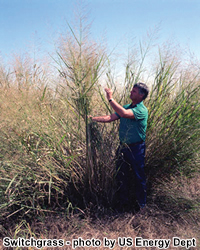|
EarthTalk, a feature in E Magazine, recently answered a reader query about the benefits of biomass as an energy source. EarthTalk responded with some good info, including:
- Biomass is natural material—mostly trees, grasses, forestry waste, and agricultural waste—that can be burned as a source of heat (for warmth and cooking meals) and for generating electricity. In the US, biomass accounts for a little less than 1% of the electricity supply.
- Firewood is a classic example of biomass, but biomass is finding more exotic uses too; for instance, as a feedstock for ethanol and biodiesel.
- Biomass is a renewable energy source that is carbon-neutral since the CO2 released by burning or otherwise consuming it is recaptured by next year's crop.
All that sounds great, right? Yes, but the
EarthTalk piece
mentions one potential problem with biomass: To be considered sustainable, biomass cannot be used faster than it grows back. That's a great point. Violating this rule is why so many villages in Africa have an ever-increasing "barren ring" around them, as villagers venture further and further in their unsustainable quest to continue gathering more fuel wood than nature can grow back.
But there are two other big flies in the biomass ointment that the EarthTalk piece overlooks that make the sustainability of biomass at a large scale somewhat dubious.
(1) Soil Health
To do biomass in a truly sustainable manner, one must figure out how much wood, crop residue, or other usable material can be taken away without resulting in long-term degradation of soil quality.
This is related to the "not taking more than can grow back" issue, but it's important in its own right. Taking the entire crop from
 an area year after year to burn or convert into liquid biofuels leaves no decaying matter to feed the soil organisms that are essential to creating a healthy soil ecosystem. Healthy soil is essential to the long-term productivity of the growing operation. Which brings us to the other major limitation....
an area year after year to burn or convert into liquid biofuels leaves no decaying matter to feed the soil organisms that are essential to creating a healthy soil ecosystem. Healthy soil is essential to the long-term productivity of the growing operation. Which brings us to the other major limitation....
(2) Net Energy and External Inputs
Industrial agriculture, which largely ignores true soil health, makes up for that deficiency by adding synthetic fertilizers, which are sourced from fossil fuels and other finite resources. This is the equivalent of a student over-consuming caffeine so he can stay up and cram the night before a big exam or athletes using steroids to enhance performance. There's a notable short-term boost in performance, but in the long run the method is unsustainable (and outright harmful if continued).
As supplies of fossil fuels and other key inputs to industrial agriculture hit their production peaks, those inputs will become increasingly expensive and, ultimately, minimally available. We will then be limited to whatever nutrients can be regained using traditional methods like cover cropping, manure from grazed animals, and waiting for more topsoil to form via weathering and bio-breakdown of rock. Even though such methods produce the healthiest, most sustainable soil, they are comparatively slow—they don't give that quick (but temporary) productivity boost that most modern agriculture operations have become so reliant on.
Without their external inputs, today's biomass operations aren't likely to look so appealing, and they certainly won't scale up to replace any significant percentage of our soon-to-be-declining fossil fuels.
Soil health is an issue that is routinely ignored in the current rah-rah coverage of ethanol, biodiesel, and biomass. Grinning Planet is in favor of pursuing these energy sources sustainably, but pursuing them in an unsustainable manner merely trades our current bad energy approach for a different bad energy approach, and keeps us on the road to agricultural ruin.
As for net energy—also called "energy returned on energy invested" (EROEI)—it is the key to why none of the wannabe energy solutions are as good as oil from an energy/profit standpoint. Oil is king when it comes to net energy.
|
Remember that petroleum (as well as coal and natural gas) are essentially concentrated ancient sunlight—things grew and died; collected, heated, and compacted over millions of years; and ultimately became fossil fuels. On such a geological scale, all biofuels, including biomass, are essentially grown and used in real time—with no bank of previously stored inputs providing a "free energy bonus".
|
|
NET ENERGY NUMBERS |
|
The energy returned on energy invested for US-sourced petroleum is estimated to be somewhere between 5 and 10. The EROEI for corn-sourced ethanol is less than 2 (and probably closer to 1, when all inputs are correctly accounted for). That sort of shortfall is a big problem as we head into a future of constrained petroleum supplies.
|
|
The marginal EROEI of biofuels is why there is no possibility that they can be scaled up to replace any significant portion of petroleum at today's level of energy use. Don't get us wrong—Grinning Planet is no fan of oil. Its reign is coming to a close, and it's imperative that "we leave oil before it leaves us," as Richard Heinberg puts it. But all the happy talk about petroleum alternatives needs to be examined under the cold, hard light of net energy—with the sustainability of each biomass approach verified—to know whether the promises are real or whether biomass is just the latest energy fad and another way for someone somewhere to make a quick buck.
Whether biomass is burned directly, used to generate electricity, or refined into liquid fuels, it will no doubt have some role in our energy future. But the sustainability limitations on biomass mean we cannot count on it to scale up to help solve our energy problems or our greenhouse gas problems.
Know someone who might like this article about Biomass and Sustainability? Please forward it to them.
|


